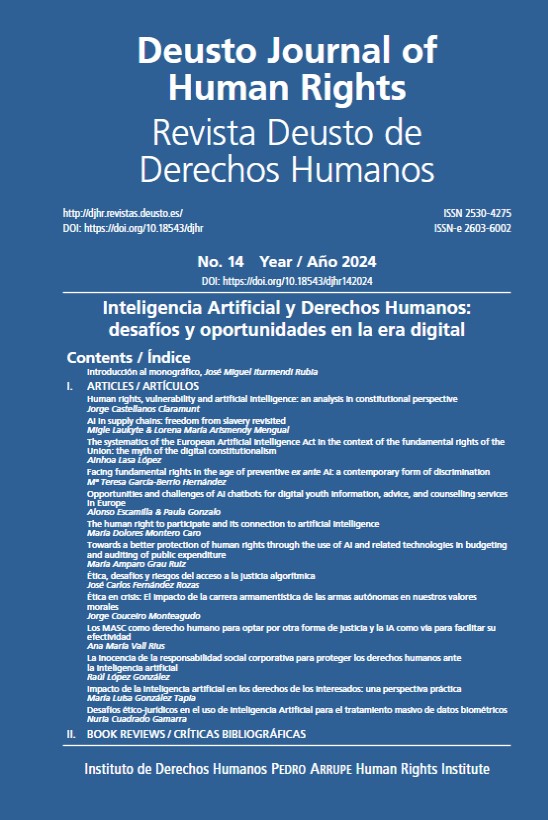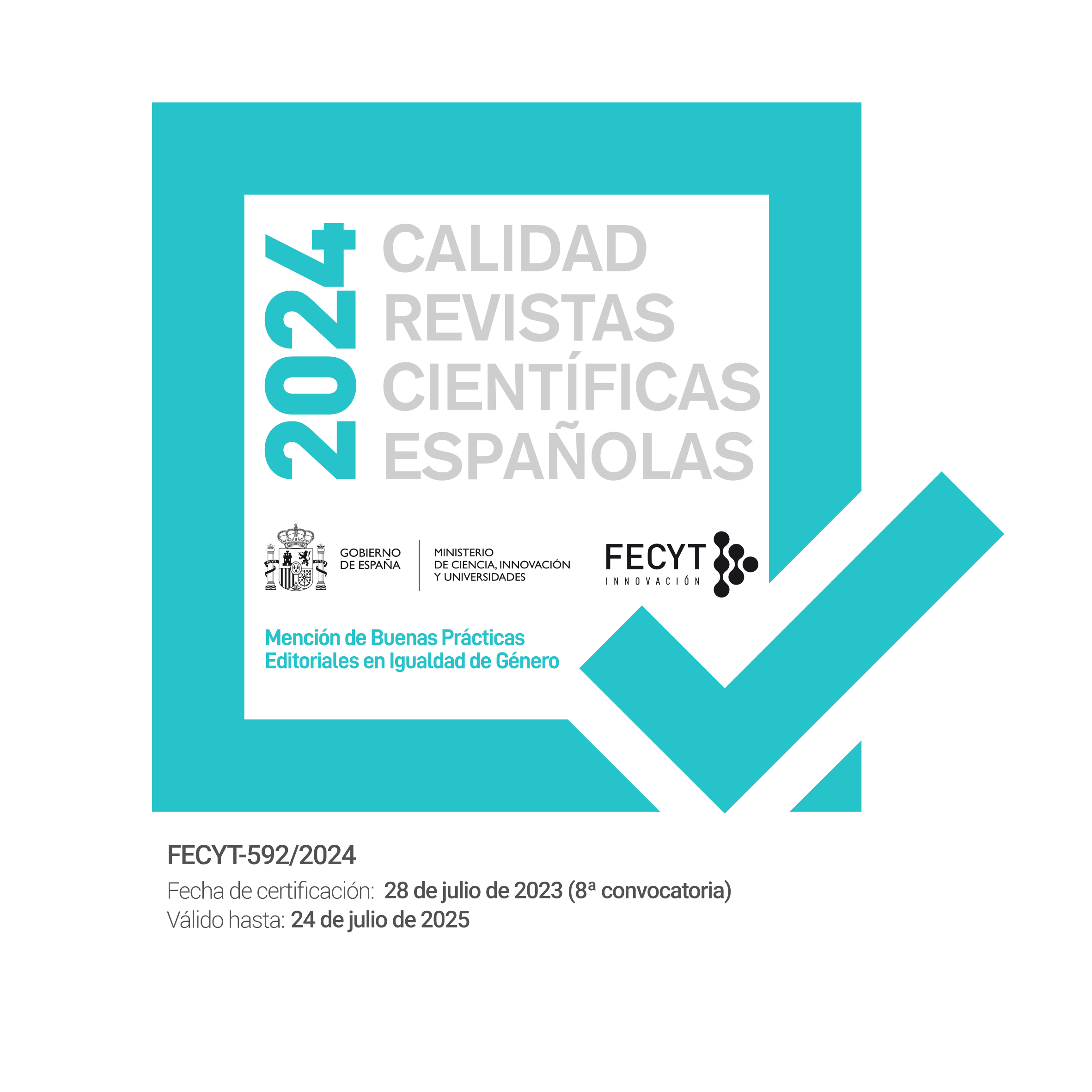La inocencia de la responsabilidad social corporativa para proteger los derechos humanos ante la inteligencia artificial
Resumen
La ética, la filosofía y la ciencia han permitido a la humanidad resolver los desafíos más complejos a lo largo de su historia. La dignidad humana es el fin ulterior de una civilización, tanto el Renacimiento como la Ilustración sintetizan lo mejor de la ciencia y el pensamiento. Por la ciencia y la dignidad humana llegaron la genética, la digitalización, la neurociencia y la computación cognitiva, que trasladan hoy la civilización humana hacia la cuarta revolución industrial. En la dignidad humana se hace imperativo reconocer el legado auténtico de Adam Smith. Sus mayores críticos no han leído su teoría del sentimiento moral, y sus mayores defensores desacreditan que Smith fuera ante todo humanista, luego economista. Los directivos más avezados abrazarán un capitalismo comprometido con la dignidad humana, sin complejos. Este ensayo enlaza capitalismo y tecnología, para enaltecer la privacidad y el trabajo digno.
Recibido: 30 mayo 2024
Aceptado: 07 septiembre 2024
Descargas
Citas
Alden, Eric. 2011. «Shareholder activism by public pension funds and the rights of dissenting employees under the First Amendment», Harvard Journal of Law & Public Policy 34: 289-366.
Aristóteles. n.d. Ética a Nicómaco. Barcelona: Orbis.
Bacon, Francis y Matthew Thompson. 1928. Selections. Acceso el 1 de Octubre de 2024. https://books.google.com/books?id=I4c3AAAAMAAJ.
Bai , Xuezhu y William Roberts. 2011. «Taoism and its model of traits of successful leaders», Journal of Management Development 30 (7/8): 724-739.
Benhabib, Seyla. 2004. The rights of others: Aliens, residents, and citizens. Cambridge: Cambridge University Press.
Blanco Brotons, Francisco José. 2023. «El idealismo discursivo en la teoría de la justicia: una crítica a Rainer Forst». Cuadernos salmantinos de filosofía 50: 247-268.
Connolly, William E. 2002. Neuropolitics: Thinking, culture, speed, NED-New edition 23. Acceso el 16 de abril de 2024. https://jstor.org/stable/10.5749/j.cttts8p6.
D´Angour, Armand. 2022. Aristóteles, el arte de innovar. Badalona: Kõan.
Etxeberria, Xabier. 1998. Ética básica. Bilbao: Universidad de Deusto.
Ey, Henri. 1967. La conciencia. Madrid: Gredos.
Farrington, Benjamin. 1971. Francis Bacon, filósofo de la Revolución Industrial. Madrid: Ayuso.
Franck, Thomas. 2019. «Facebook is downgraded as analyst warns its executive exodus could be contagious». CNBC, marzo 18.
Freud, Sigmund, Ramon Rey Ardid y Luis López-Ballesteros. 1973. El yo y el ello. Madrid: Alianza.
Helbing, Dirk. 2015. «Societal, economic, ethical and legal challenges of the digital revolution: from big data to deep learning, artificial intelligence, and manipulative technologies», Arxiv. https://doi.org/10.48550/arXiv.1504.03751.
Kholberg, Lawrence. 1958. Kohlberg’s original study of moral development («The development of modes of thinking and choices in years 10 to 16»). New York: Garland Publishing.
Koide-Majima, Naoko, Shinji Nishimoto y Kei Majima. 2024. «Mental image reconstruction from human brain activity: Neural decoding of mental imagery via deep neural network-based Bayesian estimation.» Neural Networks 170: 349-363.
Lanteri, Alessandro. 2021. «Strategic drivers for the fourth industrial revolution», Thunderbird International Business Review 63 (3): 273-283. https://doi.org/10.1002/tie.22196.
López Rojas, José. 2024a. «Inteligencia artificial: Reconfigurando el paradigma financiero del siglo XXI», III Encuentro Nacional e Internacional de Contabilidad y Fiscalidad. Rionegro, Antioquia. 8.
López Rojas, José. 2024b. «Tras la llegada de la IA, ¿caerá el invierno sobre el mercado de trabajo?». The Conversation, 30 de abril.
Martín Loeches, Manuel, Pilar Casado y Alejandra Sel. 2008. «La evolución del cerebro en el género Homo: la neurobiología que nos hace diferentes». Revista de Neurología 46 (12): 731-741.
Mèlich, Joan-Carles. 2013. Ética de la compasión. Barcelona: Herder.
Mirandola, Giovanni Pico della. 1978. Discurso sobre la dignidad del hombre. Buenos Aires: Goncourt.
Miratvilles, Luis. 1969. Visado para el futuro. Madrid: Salvat.
Mitcham, Carl. 1989. ¿Qué es la filosofía de la tecnología? Barcelona: Antrophos.
Naciones Unidas. 2024. Human Development Index. Acceso el 12 de mayo de 2024. https://hdr.undorg/.
NBCNews. 2018. ‘I’m sorry’: Facebook CEO Mark Zuckerberg delivers opening statement at senate hearing. abril 18. Acceso el 15 de mayo de 2024. https://www.youtube.com/watch?v=UofMQ8EGmSc.
Nowotny, Helga. 2014. La curiosidad insaciable. Barcelona: UOC. Acceso el 15 de mayo de 2024. https://lectura.unebook.es/viewer/9788490291122.
Porter, Michael E. 1979. «How competitive forces shape strategy», Harvard Business Review 57 (2): 137–145.
Punset, Eduard. 2007. El alma está en el cerebro. Barcelona: Destino.
Savater, Fernando. 1992. «Vitalismo», en Concepciones de la ética, editado por Victoria Camps, Osvaldo Guariglia y Fernando Salmerón, 297-308. Madrid: Trotta.
SEC. 2024. United States. Securities and exchange commission. abril 24. Acceso el 12 de mayo de 2024. https://www.sec.gov/ix?doc=/Archives/edgar/data/1326801/000132680124000012/meta-20231231.htm.
Sellars, Wilfrid. 1956. Empiricism and the philosophy of mind. Cambridge Massachusetts: Harvard University Press.
Shleifer, Andrei. 2004. «Does competition destroy ethical behavior?.» American economic review 94 (2): 414-418.
Smith, Adam. 1723-1790. The theory of moral sentiments / Adam Smith ; Introduction by Amartya Sen ; edited with notes by Ryan Patrick Hanley. New York: Penguin Group.
Spinoza, Benedictus de. 2019. Tratado teológico-político. Madrid: Verbum. Acceso el 12 de mayo de 2024. http://www.digitaliapublishing.com/a/63862/.
Ted Tschang, Feichin y Esteve Almirall. 2021. «Artificial intelligence as augmenting automation: Implications for employment». Academy of Management Perspectives, 35 (4): 642-659.
Voltaire. 1977. Tratado de la Tolerancia. Barcelona: Crítica.
Young, Iris Marius. 2011. Responsabilidad por la justicia. Madrid: Morata. Paideia Galiza Fundación.
Yum, June Ock. 1988. «The impact of Confucianism on interpersonal relationships and communication patterns in East Asia.» Communication Monographs 55 (4): 374-388. https://doi.org/10.1080/0393637758809376178.
Deusto Journal of Human Rights / Revista Deusto de Derechos Humanos es una revista de Acceso Abierto; lo que significa que es de libre acceso en su integridad inmediatamente después de la publicación de cada número. Se permite su lectura, la búsqueda, descarga, distribución y reutilización en cualquier tipo de soporte sólo para fines no comerciales y según lo previsto por la ley; sin la previa autorización de la Editorial (Universidad de Deusto) o la persona autora, siempre que la obra original sea debidamente citada (número, año, páginas y DOI si procede) y cualquier cambio en el original esté claramente indicado. Cualquier otro uso de su contenido en cualquier medio o formato, ahora conocido o desarrollado en el futuro, requiere el permiso previo por escrito de la persona titular de los derechos de autoría.



3.jpg)
3.jpg)
3.jpg)
.jpg)








